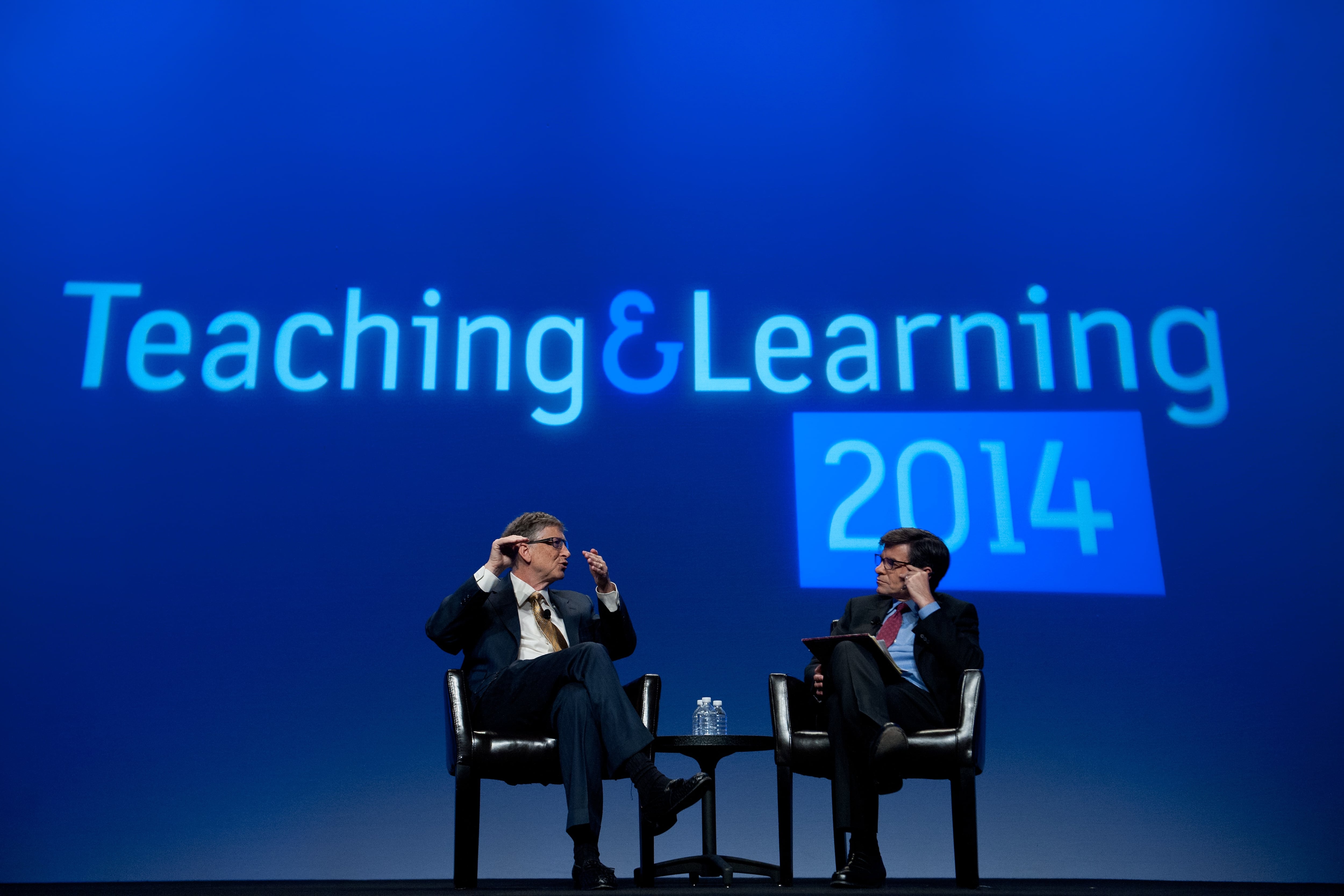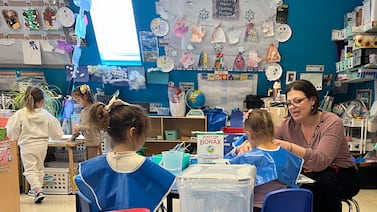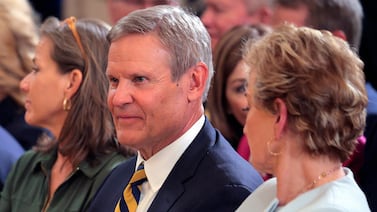Soon after the pandemic shuttered school buildings across the state, New York Gov. Andrew Cuomo announced an ambitious plan to “reimagine” education in the state with the help of the Bill and Melinda Gates Foundation.
“Let’s take this experience and really learn how we can do differently and better with our education system in terms of technology and virtual education,” Cuomo told reporters a year ago, saying the effort would be a collaboration with the Gates Foundation.
The announcement drew widespread attention. It seemed like a blast from the recent past: a deep-pocketed foundation shaping education policy.
But this time, it didn’t play out that way. There was a swift backlash, and it soon became clear the ambitions of the plan were much more modest in scope. In fact, there’s no indication the philanthropy played any role at all, and Gates did not issue any grants to the state.
Why the plan apparently fell apart is unclear, but it’s one recent example of the waning role of education philanthropy in national and state policymaking.
That marks a rather dramatic change from just a few years ago, when wealthy benefactors helped reshape American education in remarkably swift fashion. But their priorities don’t appear to be affecting school policy in the way they used to. That likely reflects the fierce backlash to philanthropies’ influence during the Obama era, as well as a scaled-back federal role in education, a Trump administration that some funders viewed as toxic, and now a Biden administration that is closer to teachers unions. Plus policymakers, schools, and perhaps funders themselves have shifted their focus to the pandemic and its fallout.
“Philanthropy used to be very influential in shaping policy,” said Leslie Finger, who studies education philanthropy at University of North Texas. “But I think these days, philanthropy is not in the driver’s seat.”
Big donors don’t have a unified vision to sell Biden
The Obama administration was closely tied — both in philosophy and personnel — with leading education funders. A number of these donors, especially Gates, backed the Common Core academic standards, tougher teacher evaluations, and more charter schools, ideas Obama’s Race to the Top program also encouraged states to adopt.
It does not appear that the Biden administration is similarly entwined with big education philanthropies. “My sense is that the people whose voices matter more in the Biden administration are teachers and teachers unions,” said Finger. (Notably, though, the Biden administration has already broken from the union on a couple of issues.)
So far, the new administration has focused on passing a stimulus that included a massive tranche of education money, and encouraging schools to offer in-person instruction. On the policy front, Biden is seeking to drive even more money to high-poverty schools, with a proposal to more than double Title I. The White House has also indicated that it wants to pressure states to improve their funding formulas.
Those priorities mark a break from many big education philanthropies, where spending more public money for schools has not been a top goal; instead their focus has typically been on overhauling how schools are run or creating alternatives to district public schools.
Admittedly, tracking the influence of education philanthropy is quite difficult. Some funders disclose their giving, but others do so in a piecemeal fashion or not at all. (It’s challenging even to say whether donations targeting education policy have declined or increased in recent years, although there’s little indication of a sharp dropoff that would explain funders’ declining influence.) Many of these rich donors also separately spend on elections, including school board races.
But what’s clear is that philanthropies and the organizations they fund aren’t offering the same unified and sweeping set of ideas that took hold during the Obama years.
That administration helped “align the philanthropic community around an agenda that gets everybody rowing in the same direction,” said Joanne Weiss, who led Race to the Top at Obama’s Department of Education and now consults with some education donors. “After the administration ended ... every foundation then went off and was in its own little row boat.”
The ambitions of major philanthropies may have narrowed in recent years
“After nearly four decades, the bipartisan coalition that pushed higher standards, tests, and accountability systems to improve public education has fractured,” Bruno Manno, an advisor the Walton Family Foundation, and Lynn Olson, a former Gates Foundation official, recently wrote. In the wake of this fracturing, they recommended a “new bipartisan education agenda” that called for better efforts to connect schools to the workplace. Notably absent, though, were calls for sweeping or contentious changes to federal policy.
(Chalkbeat is philanthropically supported by Arnold Ventures, The Bill and Melinda Gates Foundation, the Emerson Collective, and the Walton Family Foundation.)
Indeed, it’s not clear that philanthropies have the same far-reaching ambitions that they used to, perhaps chastened by the mixed results and sometimes harsh criticism of some of their high-profile initiatives.
For instance, The Gates Foundation, which has historically been the biggest education funder in the country, has recently invested in networks of schools that work together to improve each other, with the goal of letting local educators drive change — a shift from more top-down, policy-focused approaches.
Asked whether the philanthropy has intentionally scaled back its ambitions, a Gates spokesperson said it hadn’t. “Specifically, we are working alongside our partners to increase adoption of high-quality curriculum and materials, develop strong networks of schools to help address issues in different local contexts, and increase student supports such as high-dosage tutoring and advising,” Josie McSpadden said in an email.
Foundation officials have said that despite Bill and Melinda Gates’ impending divorce, they both remain committed to the foundation.
As for the planned collaboration with New York, a Gates spokesperson referred questions to a Cuomo spokesperson, who did not respond to requests for comment. But two members of the “reimagine education” council say they never spoke to anyone from the Gates Foundation. The emphasis was on figuring out how to operate school buildings in the midst of the pandemic, not overhauling how schools are run generally, as the “reimagining” implied. “We were just focused on COVID-related things,” said Martin Palermo, a Long Island high school teacher who was on the committee.
Meanwhile, the Broad Foundation, whose founder Los Angeles billionaire Eli Broad died a few weeks ago, has also pivoted its approach in recent years. The Broad Foundation ended its high-profile prize for urban school districts in 2015, and in 2019 spun off its training institute for school system leaders to Yale University.
The foundation is now focused on “increasing access to the educational opportunities, life skills, training and other experiential learning” in Los Angeles specifically, said spokesperson Suzi Emmerling. “Though this is an evolution in our grantmaking strategy, the Foundation still believes a strong public education system is fundamental to an equitable society,” said Emmerling, who noted that the philanthropy has plans to continue after its founder’s death.
Another large grantmaker, the Chan Zuckerberg Initiative, has emphasized “personalized learning” supported in part by technology. That marked a shift from its founder Mark Zuckerberg’s initial foray into education giving — a $100 million grant to overhaul Newark schools, a move that quickly turned controversial.
Now CZI’s signature initiative, a program called Summit Learning, has been adopted in a few hundred schools, but its growth has stalled recently and fallen short of initial ambitions. A spokesperson for CZI highlighted the organization’s efforts to expand broadband access amidst the pandemic.
The Emerson Collective — funded by Laurene Powell Jobs, the widow of Steve Jobs — has given high-profile multi-million dollar grants to several innovative high schools through an organization known as XQ, but some of its schools have struggled and it’s not clear the effort has made a broader impact.
Of course, philanthropies certainly retain some significant influence in education, at least through the constellation of groups that they fund. And the new administration also has some connections with education funders.
Still, donors face yet one more challenge if they want to nudge schools policy in a preferred direction. The nearly $200 billion in one-time stimulus funds have left school districts in an unusual position — flush with cash. That makes it harder for philanthropies to dangle a small amount of money to get school systems to make big reforms.
“For funders that does change the ecosystem,” said Sarah Reckhow, who has examined education philanthropy at Michigan State University. “It was already pennies on the dollar … But now we’re probably talking like decimals points of pennies.”
Funder-backed school choice efforts see less traction at the national level, more in states
Former education secretary Betsy DeVos, herself a major education donor, had almost no success in expanding choice policies at the federal level, despite making it her top goal. The Biden administration is not expected to advance choice policies and may even oppose them.
The success of these efforts varies from state to state and city to city, but the politics of charter schools has grown more complicated in recent years, and charter growth has slowed in some parts of the country.
The Walton Family Foundation, has continued to pump money into charter schools and the organizations that promote them. “Our idea that families should make decisions about how their children are educated is consistent, absolutely,” Marc Sternberg, the foundation’s head of K-12 giving, said in an interview.
The City Fund — a vehicle of Netflix CEO Reed Hastings and Texas billionaire and former hedge fund manager John Arnold — has devoted over $100 million to advance charter schools and the “portfolio model” in a number of cities.
Backers of private school choice programs — typically using public money or state-backed tax credits to subsidize private school tuition — have seen a flurry of wins this year, perhaps fueled by some policymakers’ dissatisfaction with public schools’ response to COVID. DeVos and her family, the Walton Family Foundation, billionaire businessman Charles Koch, and California businessman and chair of the pro-voucher American Federation for Children William Oberndorf have in recent years backed efforts to expand such choice programs.
Sternberg said he’s not concerned about any opposition to school choice efforts from the Biden administration because parents are already making choices on their own, especially in the wake of COVID.
“Enrollment shifts that are happening in the country … are like nothing I have ever seen before,” he said. “I don’t think any White House would dare get in the way of that.”





